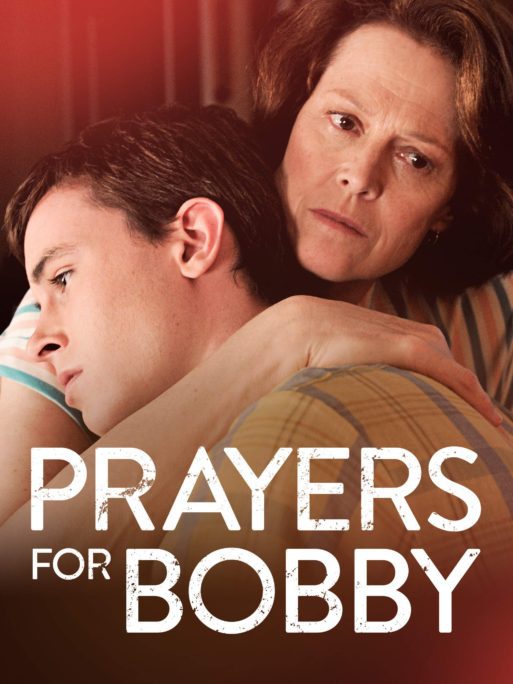 “Prayers for Bobby,” based on the book of the same name, tells the real life story of Bobby Griffith and, more importantly, of the spiritual journey of his mother, Mary Griffith.
“Prayers for Bobby,” based on the book of the same name, tells the real life story of Bobby Griffith and, more importantly, of the spiritual journey of his mother, Mary Griffith.
At the beginning of “Prayers for Bobby,” Bobby Griffith (Ryan Kelley) is portrayed as a young man in a loving and religiously conservative family. But Bobby has a secret. He is questioning his sexuality and eventually realizes he is gay.
He tells his older brother, who, not knowing what else to do, confides in their mother, Mary (Sigourney Weaver). Mary believes that homosexuality is at worst a sin and at best an illness. She sets out to cure Bobby through prayer and therapy. She bombards him with Bible verses and tells him that he’s not trying hard enough when he admits to still having gay feelings.
Finally, Bobby leaves home to live with a cousin who is more accepting of him. Mary’s last words to Bobby are, “I won’t have a gay son.”
Away from his mother, Bobby explores the gay community and even begins a tentative relationship. His mother’s words and his own religious beliefs, though, continue to haunt him. He becomes depressed and self-destructive.
One night, he climbs onto an overpass and throws himself into the path of an oncoming truck. He dies instantly.
A Mother Finds Meaning
This story – as so many have – could have ended tragically with Bobby’s death. Instead, it has only begun. Mary wants reassurance that her son died in a state of grace, reassurance her church cannot offer her. Then she asks the ministry what they are doing to help other young men like Bobby. People like that, her church tells her, are not served in their congregation.
Mary eventually makes her way to the Metropolitan Community Church. At first, she and the pastor butt heads over theology, but she slowly comes to realize that not everyone interprets the Bible the same way she does. She even agrees to meet with other parents of gay children. Finally, she has a stunning realization.
“God did not cure Bobby because he was never sick in the first place.”
She joins the organization PFLAG – Parents and Friends of Lesbians and Gays – and lobbies to make her community a more accepting place.
One of the final scenes of the movie is especially telling. Mary and other PFLAG members are marching in an annual gay pride parade. Mary sees a young man watching the parade pass. He looks sad and lonely. She leaves the parade route, approaches him, and enfolds him in her arms. It is as if she is offering him the love and acceptance she was unable to give Bobby. After a long minute, she returns to the parade, leaving the young man with a dazed smile on his face. Not a word has passed between them.

Credit: liveabout.com
“Prayers for Bobby” is a movie that evokes great emotion. It premiered on Lifetime in 2009 and ultimately garnered two Emmys, one for Best Movie and one for Best Actress (Weaver). And Sigourney Weaver is superb as a mother who has suffered a terrible loss and manages to transform her faith and turn her private tragedy into a force for good.
The supporting cast is also excellent. Ryan Kelley plays Bobby as a confused teenager trapped between his feelings for men and his mother’s demands that he fight his “disease.” Henry Czerny turns in a solid portrayal of Bobby’s stoic but grieving father.
I highly recommend “Prayers for Bobby” to people in the LGBTQ community and to those who love them. I have also talked to family members of people who completed suicide who found it comforting. But most of all, this movie speaks to the spark of kindness, humanity and fairness in all of us. It is truly worth watching.

 “Prayers for Bobby” by Russell Mulcahy
“Prayers for Bobby” by Russell Mulcahy


 Octogenarian Author Jane Seskin Offers a Model for Aging and Living Well
Octogenarian Author Jane Seskin Offers a Model for Aging and Living Well

 Are “Rage Rooms” a Healthy Outlet for Grief and Burnout?
Are “Rage Rooms” a Healthy Outlet for Grief and Burnout?















How wonderful it is by G-d’s grace to be alive!!!!!
Report this comment
I tried to share my insights earlier in the week, I was in fact as a teenage boy over 35 years ago Bobby Griffith’s lover/boyfriend! I was the only boy that Bobby wrote of in his extant journals! Prayer’s for Bobby author Leroy F. Aarons interviewed me in 1995, a year before his book’s publication and release! I loved Bobby as much as any teenager understands of love! I mistakenly blamed myself for years! But nine little words from Leroy’s biographical work, in the chapter “The Leper”, always hurt to learn that my Bobby was made to feel himself a Leper! Of me Bobby recorded “He is so sweet and good to me”!
Report this comment
Hi Blaine,
Losing Bobby must have been very hard for you, especially as a teenager. Still, it’s good to know that you were there for him during those very difficult and confusing times. I’m so glad that the world is becoming more accepting of LGBTQ youth. No child should feel he needs to die to escape his pain.
Report this comment